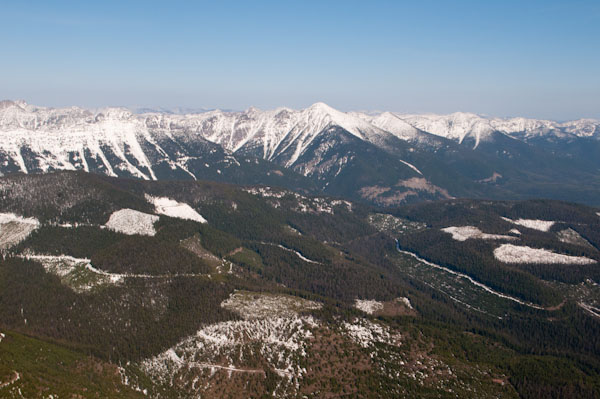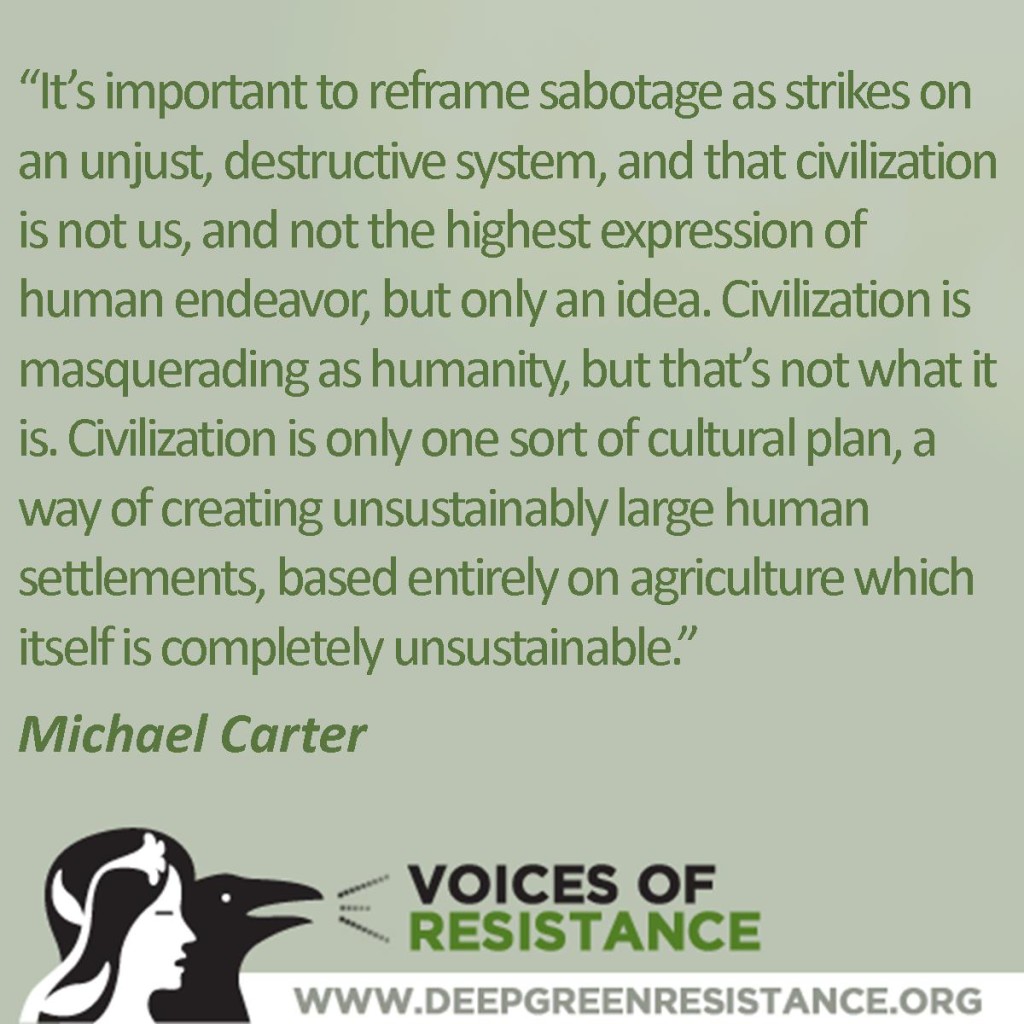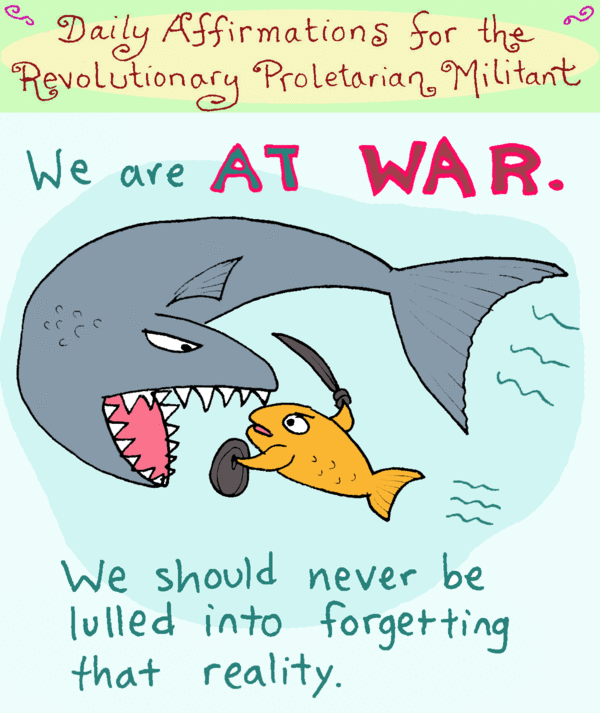In 1993 Michael Carter was arrested and indicted for underground environmental activism. Since then he’s worked aboveground, fighting timber sales and oil and gas leasing, protecting endangered species, and more. Today, he’s a member of Deep Green Resistance Colorado Plateau, and author of the memoir Kingfishers’ Song: Memories Against Civilization.
Time is Short spoke with him about his actions, underground resistance, and the prospects and problems facing the environmental movement. Due to the length of the interview, we’ve presented it in three installments; go to Part II here, and Part III here.
Time is Short: Can you give a brief description of what it was you did?
Michael Carter: The significant actions were tree spiking—where nails are driven into trees and the timber company warned against cutting them—and sabotaging of road building machinery. We cut down plenty of billboards too, and this got most of the media attention. We did this for about two years in the late ‘80s and early ‘90s, about twenty actions. My brother Sean was also indicted. The FBI tried to round up a larger conspiracy, but that didn’t stick.
TS: How did you approach those actions? What was the context?
MC: We didn’t know a lot about environmental issues or political resistance, so we didn’t have much understanding of context. We had an instinctive dislike of clear cuts, and we had the book The Monkey Wrench Gang. Other people were monkeywrenching, that is, sabotaging industry to protect wilderness, so we had some vague ideas about tactics but no manual, no concrete theory. We knew what Earth First! was, although we weren’t members. It was a conspiracy only in the remotest sense. We had little strategy and the actions were impetuous. If we’d been robbing banks instead, we’d have been shot in the act.
Nor did we really understand how bad the problem was. We thought that deforestation was damaging to the land, but we didn’t get the depth of its implications and we didn’t link it to other atrocities. We just thought that we were on the extreme edge of the marginal issue of forestry. This was before many were talking about global warming or ocean acidification or mass extinction. It all seemed much less severe than now, and of course it was. The losses since then, of species and habitat and pollution, are terrible. No monkeywrenching I know of did anything significant to stop that. It was scattered, aimed at minor targets, and had no aboveground political movement behind it.

Clearcuts in the Swan Valley, MT near Loon Lake on the slope of Mission Mountains. Photo by George Wuerthner.
TS: What was the public response to your actions?
MC: They saw them as vandalism, mindlessly criminal, even if they were politically motivated. This was before 9/11, before the Oklahoma City bombing; the idea of terrorism wasn’t so powerful, so our actions weren’t taken nearly as seriously as they would be now.
We were charged by the state of Montana with criminal mischief and criminal endangerment. The state’s evidence was solid enough we thought we couldn’t win a trial, so we pled guilty on the chance the judge wouldn’t send us to prison. Our defense was to say, “We’re sorry we did it, it was motivated by sincerity but it was dumb.” And that was true. We were able to get our charges reduced from criminal endangerment to criminal mischief. I got a 19 year suspended prison sentence, Sean got 9 years suspended. We both had to pay a lot of money, some $40,000, but I only spent three months in county jail and Sean got out of a jail sentence altogether. We were lucky.
TS: As you said, this was before the obsessive fear of terrorism. How do you think that played into your trial and indictment, and how do you think it would be different today?
MC: Had it happened after any big terrorism event, they would have sent us to prison, there’s no doubt about that. States have to maintain a level of constant fear and prove themselves able to protect citizens.
The irony was, I’m not sure I wanted to be serious—there seemed to be something protective in not being all that effective, in being intentionally quixotic, in being a little cute about it. There was a particularly comical aspect to cutting down billboards, and that was helpful only when I was arrested. It made it look less like terrorism and more like reckless things I did when I was drunk, and a lot of people approved of it because they thought billboards were tacky. I want to emphasize that cutting down billboards is nothing I’d advise anyone to consider, only that a little bit of public approval made a surprising difference to my morale, and may have positively influenced sentencing. But the point, of course, is to be effective and not get caught in the first place. These days, if someone gets caught in underground actions, they will be in a lot more trouble than ever before.
TS: How did you get caught?
We left fingerprints and tire tracks, we rented equipment under our own names—like an acetylene torch used to cut down steel billboard posts—and we told people who didn’t need to know about it. We assumed we were safe if they didn’t catch us in the act and because our fingerprints weren’t on file, and we couldn’t have been more wrong. The cops can subpoena anyone’s fingerprints, and use that evidence for something in the past. The importance of security can’t be overstated—and we didn’t have any. Even with a couple rudimentary precautions, we might have saved ourselves the whole ordeal of getting caught. If we’d read the security chapter of Dave Foreman’s book Ecodefense, I don’t think we would have even come under suspicion. Anyone taking any action, above- or underground, needs to take the time to learn security well.
It’s not just saving yourself the anguish of arrest and prison time. If you’re rigorous about security, you might be able to have a real chance at changing how the future of the planet plays out. You can have no impact at all in a jail cell. In our case, we definitely could have stopped timber sales with tree spiking even though that tactic was extremely unpopular politically. It was seen as an act of violence against innocent lumber mill workers instead of a preventative measure to protect forests. The dilemma never got past that stage, though. We had little chance of having any reasoned tactical considerations—let alone making reasoned decisions—because we were always a little too afraid of being caught. With good reason, it turns out.
TS: What have you learned from your experience? Looking back on what you did all those years ago, what’s your perspective on your actions now? Is there anything you would have done differently?
MC: Well I definitely would have taken steps to not get caught. I would have picked my targets more carefully, and I would have entered into an understanding with myself that while my enemy is composed of people, it’s only a system, inhuman and relentless. It can’t be reasoned with; it has no sanity, no sense of morality, no love of anything. Its job is to consume. I would have tried to focus on that guiding fact, and not on the people running it or who were dependent on it. I would have tried to find the weaknesses in the system, and then attacked those.
I’d have tried not to allow my emotions to dictate my strategy or actions. Emotions might get me there in the first place—I don’t think you could get to such a desperate point without a strong emotional response—but once I arrived at the decision to act, I would have done everything I could to think like a soldier, find a competent group to join with, and pick expensive and hard-to-replace targets.
TS: I assume you didn’t just wake up one day and decide to attack bulldozers and billboards. What was your path from being apolitical to having the determination and the passion to do what you did?
MC: When I was struggling with high school, my brother loaned me a stack of Edward Abbey books, which presented the idea that wilderness is the real world, precious above all else. The other part was living in northwest Montana, where you see deforestation anywhere you look. You can’t not notice it, and there’s something about those scalped hills and skid trails and roads that triggers a visceral, angry response. It’s less abstract than atmospheric carbon or drift-net fishing. You don’t see those things the way you see denuded mountainsides. My family heated the house with wood, and we would sometimes get it out of slash piles in the middle of clearcuts. I had lots of firsthand exposure to deforested land. I wondered why the Sierra Club didn’t do something about it, how it could be allowed. We would occasionally go to Canada, and it was even worse up there. No one can feel despair like a teenager, and I had it in spades. If Greenpeace won’t stop this, I reasoned, well then I will.
I started building an identity around this, though, and that’s disastrous for a person choosing underground resistance. You naturally want others to know and appreciate your feelings and accomplishments, especially when you’re young, but the dilemma underground fighters face is that they must present another, blander identity to the world. That’s hard to do.
TS: You were fairly isolated in your actions, and you’ve emphasized the importance of a larger context. Do you see those two ideas connecting? Do you think saboteurs should be acting in a larger movement?
MC: I think saving the planet relies completely on the coordinated actions of underground cells coupled with an aboveground political movement that isn’t directly involved in underground actions. When I was underground, I had no hope of building a network, mostly because of a lack of emotional and political maturity. I also didn’t have the technological or strategic savvy, or a means of communicating with others. The actions themselves were mostly symbolic, and symbolic actions are a huge waste of risk. They’re a waste of political capital too. Most everyone is going to disagree with underground activism and it’s not going to change anyone’s mind about the policy issue—hardly anything will—so it has to count in the material realm. If people are ready and willing to risk their lives and their freedom then they should fight to win, not just to make some sort of abstract point.
TS: After you were arrested, what support—if any—did you receive from folks on the outside, and what support would you have wanted to receive?
MC: The most important support was financial, but there wasn’t a lot of it. Our plea bargain didn’t guarantee we wouldn’t go to prison. We were also worried that the feds would indict us for racketeering, an anti-Mafia charge with serious minimum sentencing. If we’d had more legal defense financing we’d of course have felt a lot more secure, but twenty years of reflection tells me we didn’t really deserve it considering how poorly we executed the actions, what little effect they caused.
That sounds like I’m being awfully hard on myself, and hindsight is always 20/20, but the point is that a legal crisis is exhausting and expensive. Your community will question whether your actions are worthy of the price they’ll have to pay if you’re caught. My actions were not.
Even so, I appreciated any sort of support. Hearing from the outside in jail is better than you’d believe. A lot of Earth First! Journal readers sent me anonymous letters. I wrote back and forth with one of the women who was jailed for noncooperation with a federal grand jury investigating the Animal Liberation Front in Washington. Seeing approving letters to the editor in the papers was also great. Just knowing that the whole world isn’t your enemy, that someone is thinking about you and appreciates what you did, is priceless.
TS: Do you still think militant and illegal forms of direct action and sabotage are justified? Why?
MC: I do, yes. In an ideal world I don’t think violence is the best way to accomplish anything, but obviously this isn’t an ideal world. Our circumstances are getting worse and worse—overpopulation, pollution, oceanic dead zones, you name it—and any options for a decent and dignified future for humanity are dwindling day by day, so what choice does that leave us? Individual attempts at sustainable living won’t work so long as the industrial system is running. The dismantling of infrastructure is the most important missing piece right now. It’s where the system is most vulnerable, so it should be employed right away. It can be effective, but it has to be responsible, careful, and extraordinarily smart.
One of the reasons underground political actions are so unpopular is that they’re always presented as attacks on individuals, rather than on a system. I think it’s important to reframe sabotage as strikes on an unjust, destructive system, and that civilization is not us, and not the highest expression of human endeavor, but only an idea. Civilization is masquerading as humanity, but that’s not what it is. Civilization is only one sort of cultural plan, a way of creating unsustainably large human settlements, based entirely on agriculture which itself is completely unsustainable.
The argument that militant actions are counterproductive has a little bit of merit because the scale they’ve happened on hasn’t been large enough to have any impact. For example, the Earth Liberation Front burning SUV’s. You’re left with the political fallout, the mainstream activists distancing themselves and all the other bad stuff that comes with it, but you don’t have any measurable gain, in reducing carbon emissions, say. Sabotage needs to happen on a larger scale, against more expensive targets, to be impactful. Fighters need to think big. That’s how militaries accomplish their goals—by acting against systems. They blow up bridges, they take out buildings, they disable the enemy arsenal, they kill the enemy—that’s how they function. I agree activists don’t want to identify with militarism, but it’s foolhardy to not consider what’s actually going to get the job done, and militaries know how to do that. No moral code will matter if the biosphere collapses. Doctrinal non-violence isn’t going to have any relevance in a world that’s 20 degrees hotter than it is now.
I wish an effective movement could be nonviolent, but we just don’t have enough social cohesion to orchestrate that kind of thing. There’s so few of us who give a shit, and we’re scattered, isolated, and disenfranchised. We don’t have adequate numbers, influence, or power, and I don’t see that changing. Everywhere we look we’re losing, because we don’t have a movement that can say, “No. You’re not going to do that. We will stop this, whatever it takes,” and back that up. Aboveground activists need to advocate a lesser evil, to continually pose the question of what is worse: that some property was destroyed, or that sea shells are dissolving in acid oceans? Underground activists need to act that out. It’s not a rhetorical question.
We need to remember, too, that small numbers of people can engineer profound changes when their actions are wisely leveraged. Very few took part in the resistance movements of World War II, but they made all the difference to ultimately defeating the Axis.
Time is Short: Reports, Reflections & Analysis on Underground Resistance is a bulletin dedicated to promoting and normalizing underground resistance, as well as dissecting and studying its forms and implementation, including essays and articles about underground resistance, surveys of current and historical resistance movements, militant theory and praxis, strategic analysis, and more. We welcome you to contact us with comments, questions, or other ideas at undergroundpromotion@deepgreenresistance.org



Trackbacks/Pingbacks